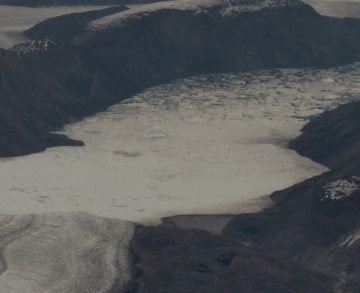John Palattella in The Point:
 A year ago, there was no snow on the ground, and I was thinking about icebergs. “We’d rather have the iceberg than the ship,” begins the first stanza of Elizabeth Bishop’s “The Imaginary Iceberg,” and continues,
A year ago, there was no snow on the ground, and I was thinking about icebergs. “We’d rather have the iceberg than the ship,” begins the first stanza of Elizabeth Bishop’s “The Imaginary Iceberg,” and continues,
although it meant the end of travel.
Although it stood stock-still like cloudy rock
and all the sea were moving marble.
These lines came to me when I was reading, walking or cooking, was alone or sharing someone’s company, and they came in all kinds of weather. “The Imaginary Iceberg” is a poem that I love, although at the time I could not remember when I had last read it. Yet there it was, its first four lines on repeat in my mind’s ear, a phantom verse.
It was March and I was in Jena, a small city in eastern Germany. The nearest sea was 340 miles to the north; the nearest icebergs, at least 2,000 miles to the northwest. The nearest body of water was the river that meandered through my neighborhood and onward through fields of winter wheat. I lived in Jena for six months, and the only memorable bits of marble I saw there were the busts of Goethe, Schiller and Hegel perched atop columns on the university campus, where those men had once taught. Otherwise, Bishop’s lines reminded me of nothing I saw around me.
More here. [Thanks to Holly Case.]
